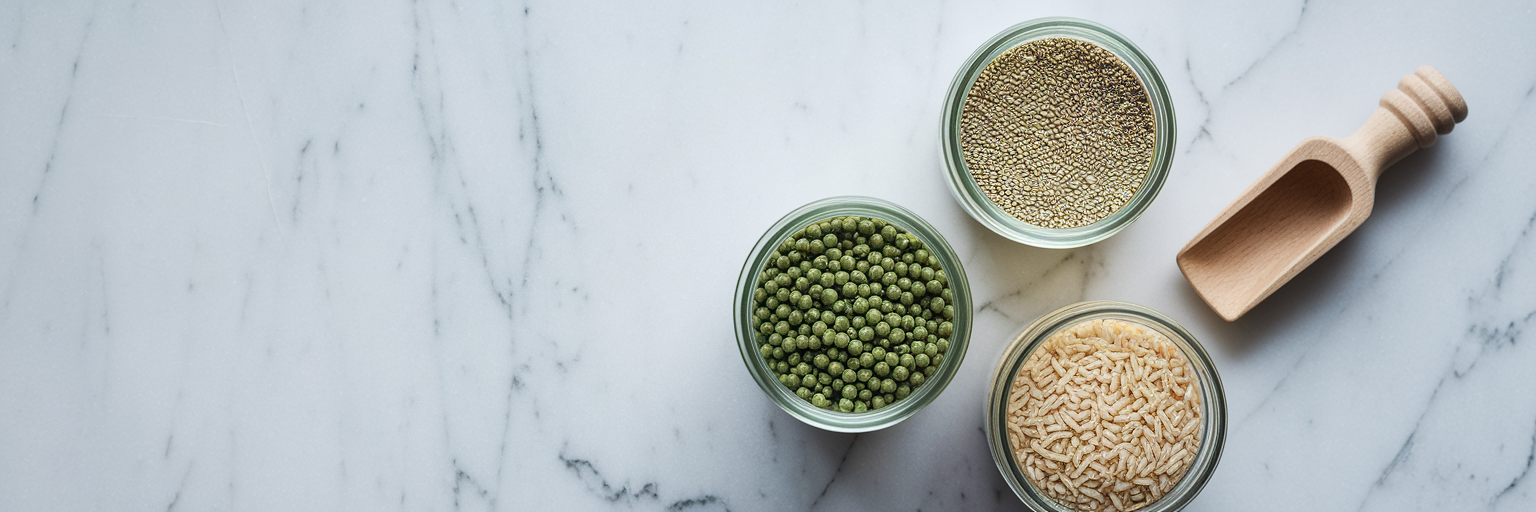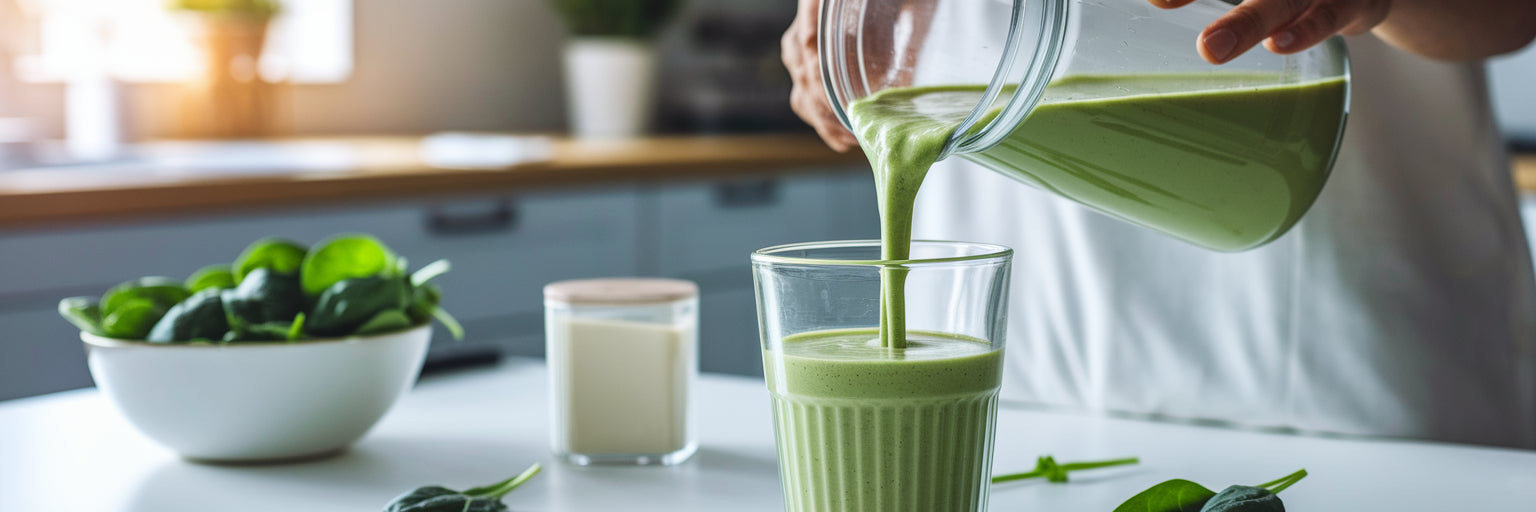Feeling the Post-Shake Bloat? You're Not Alone
You crushed your workout, mixed your protein shake with the best intentions, and then it hits: that uncomfortable, gassy feeling in your stomach. We’ve all been there. It’s a common frustration that can feel incredibly discouraging when you’re trying to do something good for your body. You might even start wondering if protein powder is right for you at all.
But what if the problem isn’t the protein itself, but the type of protein you’re using? For many people, the source of this discomfort is the dairy-based whey or casein found in most traditional powders. That heavy, bloated sensation is your body’s way of telling you it’s struggling to process something in the mix.
The search for how to reduce protein shake bloating often leads people down a rabbit hole of different brands and formulas, but the answer might be simpler than you think. This isn’t about giving up on your fitness goals. It’s about finding a gentler, more comfortable way to fuel your body. Understanding your body is a journey, and exploring our blog can help you find more resources along the way. Let's explore why this happens and how plant-based options can make all the difference.
Why Some Protein Powders Cause Digestive Distress

If you've ever felt that familiar rumble after a protein shake, you're not imagining it. The reason often comes down to a few key ingredients commonly found in traditional supplements. The most frequent culprit is lactose, the natural sugar in milk. Many adults have difficulty digesting lactose, which can lead to gas, cramping, and the very plant based protein bloating you’re trying to avoid by switching.
But lactose isn't the only potential troublemaker. Many protein powders contain a list of additives that can be tough on a sensitive gut. Think of it like this: your digestive system prefers simple, whole foods, and it can get overwhelmed by complex, highly processed ingredients. Here are a few others to watch for:
- Artificial Sweeteners: Ingredients like sucralose and aspartame can be hundreds of times sweeter than sugar, but our bodies don't always know what to do with them. For some, they can disrupt the delicate balance of gut bacteria and cause irritation.
- Sugar Alcohols: Names like erythritol and xylitol sound healthy, but they aren't fully absorbed by the gut. This can lead to a laxative effect, causing more gas and bloating as they ferment in your digestive tract.
- Gums and Thickeners: Additives like xanthan gum or carrageenan are used to create a smooth, thick texture. While generally considered safe, they can be difficult for some people to digest, leading to a feeling of heaviness and discomfort.
It’s important to remember that these ingredients aren’t inherently "bad." However, for those with sensitive systems, they can turn a healthy habit into an uncomfortable experience. Recognizing what’s on the label is the first step toward finding a powder that works with your body, not against it.
The Gut-Friendly Benefits of Plant Proteins
Switching to a vegan protein powder isn't just about avoiding irritants. It's about embracing ingredients that actively support your digestive wellness. Plant-based proteins offer a unique set of benefits that make them a naturally gut friendly protein powder, helping you feel light and energized instead of heavy and bloated.
Naturally Free of Common Irritants
The most immediate benefit is what plant proteins don't have. They are naturally free of dairy, lactose, and whey, which are the primary triggers for many people's digestive issues. This simple fact makes them an excellent choice for anyone with a lactose sensitivity or those who just feel better without dairy. By choosing a plant-based option, you eliminate the most common cause of post-shake discomfort right from the start.
A Source of Prebiotic Fiber
Unlike their dairy-based counterparts, plant proteins from sources like peas, brown rice, and seeds contain natural fiber. This fiber acts as a prebiotic, feeding the beneficial bacteria in your gut. As noted by health experts at Healthline, a thriving gut microbiome is fundamental to efficient digestion and overall wellness. This means every scoop is not just building muscle but also nurturing the ecosystem that keeps your digestion running smoothly.
Gentle and Easy to Digest
Many plant proteins are inherently gentle on the stomach. Pea protein, for example, is known for being highly digestible and less likely to cause an inflammatory response. Furthermore, sources like pea protein contain compounds that can help soothe the gut, a benefit highlighted in reports from Medical News Today. Options like our simple chocolate vegan protein made from high-quality pea protein isolate can deliver these benefits without unnecessary additives, making it a clean and comfortable choice.
How to Choose the Best Vegan Protein for Your Digestion

Not all vegan protein powders are created equal. With so many options on the market, finding the best vegan protein powder for digestion requires a little label detective work. Here’s what to look for to ensure you’re choosing a product that will make your gut happy.
-
Scrutinize the Ingredient List
This is the most important step. A truly gut-friendly protein will have a short, simple list of ingredients you can actually pronounce. Be wary of powders loaded with artificial flavors, gums, fillers, and sweeteners. The fewer ingredients, the less likely you are to encounter something that irritates your system. -
Consider the Protein Source
Vegan proteins can come from a single source (like pea, rice, or hemp) or a blend of several. If you’re new to plant proteins or have a particularly sensitive stomach, starting with a single-source powder is a great idea. It allows you to see how your body reacts to one specific ingredient before trying a more complex blend. -
Look for Quality Processing
Plants naturally contain compounds sometimes called "antinutrients" that can interfere with digestion. Don't let the name scare you. High-quality brands mitigate this through processes like sprouting or fermentation, which, as studies in the Journal of Food Science show, significantly improves the digestibility and nutrient availability of plant proteins. This extra step makes a huge difference in how easily your body can use the protein. -
Check for Third-Party Certifications
Labels like USDA Organic and Non-GMO Project Verified are more than just buzzwords. They are indicators of a cleaner product, free from pesticides and genetically modified ingredients that can add an unnecessary burden to your system. To see what clean, third-party tested supplements look like, you can explore our curated collection of products.
Simple Ways to Incorporate Vegan Protein into Your Day
One of the best things about a high-quality vegan protein powder is its versatility. It’s not just for post-workout shakes. An easy to digest protein powder can be seamlessly added to your daily meals to boost your nutrition without any fuss. Here are a few simple ideas to get you started:
- Boost Your Breakfast: Start your day strong by stirring a scoop of vanilla or unflavored protein powder into your morning oatmeal or a bowl of dairy-free yogurt. It adds a satisfying protein punch that will keep you full and focused for hours.
- Supercharge Your Smoothies: Move beyond just powder and water. For a delicious and gut-friendly smoothie, blend one scoop of vanilla vegan protein with 1/2 a frozen banana, a handful of spinach, one tablespoon of chia seeds, and unsweetened almond milk. It’s a complete, nutrient-dense meal in a glass.
- Enhance Your Baking: Add a nutritional upgrade to your favorite baked goods. Unflavored or vanilla protein powder can be mixed into recipes for pancakes, muffins, or homemade energy balls. It’s an effortless way to make your favorite treats work harder for you. If you're looking for inspiration, we've put together some simple and delicious vegan protein recipes you can try at home.
Listen to Your Body and Find Your Perfect Match
Ultimately, the journey to better digestion is personal. There is no single perfect solution for everyone, and the best approach is to listen to your own body. What works wonders for a friend might not be the right fit for you. We encourage you to experiment with different single-source plant proteins like pea, rice, or hemp to discover what makes you feel your best.
A great tip is to start with a smaller container of a new protein to see how your body responds before committing to a large tub. Pay close attention to how you feel not just immediately after, but throughout the day. Are you energized? Is your digestion calm? Finding the right vegan protein for sensitive stomachs is about this gentle process of trial and discovery.
Have you found a plant-based protein that works for you? Share your experience in the comments below! Ready to start your journey toward a happier gut? Explore our full range of clean, plant-based supplements at Beyond Good Foods.



